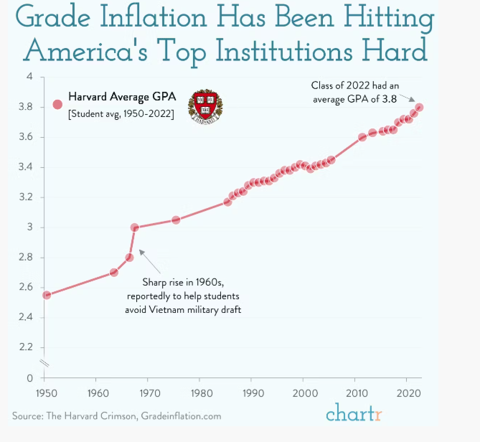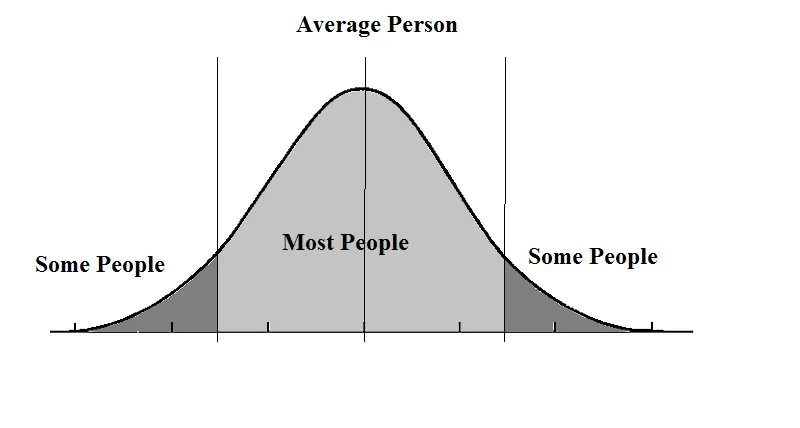But all excellent things are as difficult as they are rare. – Baruch Spinoza
Are Colleges morphing into the old Soviet Union?
Sort of.
Like the old joke about the failed Communist U.S.S.R., They pretend to work, and we pretend to pay them.
Grade inflation is the academic standard uniting our 5,300 Universities and Colleges.
Numbers don’t lie. According to the W.S.J.:
Grade inflation at American Universities is out of control. The statistics speak for themselves. In 1950, the average G.P.A. at Harvard was estimated at 2.6 out of 4.0. By 2003, it had risen to 3.4. Today, it stands at 3.8. The more elite the college, the more lenient the standards. At Yale, for example, 80% of grades awarded in 2023 were As or A minuses. However, the problem is also prevalent at less selective colleges. Across all four-year colleges in the U.S., the most commonly awarded grade is now an A.

Students are trained during K-12 to years, expecting grades they didn’t earn. My experience as a Middle School teacher illuminates this.
Debating with students over bad grades is a popular eighth-grade pastime. According to their delusional logic, anything below a C+ might as well be an F. My favorite retort focused on The Belle Curve.
The argument went something like this:
If a test is fair, most students should receive a C. That is the definition of average, despite what you may think that is where about 80% of you fall. If everybody received an A, the test is too difficult. Conversely, if most students fail, the exam is too difficult. The ideal outcome is a few A’s and F’s; the rest should fall right in the middle of the range, translating to a C.
After being told their whole lives that they were special, this info rocked their world. Avoiding reality can only get one so far. Exceptional achievement requires extraordinary effort. This graph drove home the point.

Our next debate topic focused on the school’s Honor Roll. Somewhere along the line, this list expanded to include everyone but the school’s custodial staff and Kitchen help.
My snarky suggestion: Why not list everyone who didn’t make the Honor Roll? This list would be much more exclusive.
This discussion generated more approval. Middle School students respect Wise Asses.
Why should we be concerned about this epidemic of false academic glory?
First, it bathes students in polluted waters of delusion of grandeur and entitlement to the detriment of our economic future. Employers are seeking humble, resilient, socially intelligent employees with transferrable skills. Thinking that you know everything due to inflated grades is a one-way ticket to your parent’s basement.
Second, grade inflation diminishes the achievements of students who take risks by signing up for challenging classes. These young people may get lower grades but are often more qualified than those who chose an easier path. Character and curiosity will reward them in the workforce, but a s0-so G.P.A. may hide these traits.
My son aggressively scans Rate My Professor before he picks his courses. He is looking for teachers who give out A’s like Halloween candy. He’s not the only one. Not pushing yourself to achieve your full potential is too expensive to pay for an easy A.
Finally, many parents are forking over 100k a year for elite school college tuition and room and board. Parents deserve more for their hard-earned money than the cheap dopamine rush of an easy A.
There are many ideas on how to reform this failing system. One option is to make Pass/Fail the default setting. The problem is that many schools like things the way they are. College Administrators desire to keep their customers happy. If only some schools decided to crack down, students would likely flock to the institutions with more lenient systems. High grades also feed the rankings of the perverse incentive college ranking system that serves as an altar for all that is wrong with the current arrangement.
Yascha Mounk, a professor at Johns Hopkins, provides a glide path for reform.
He suggests:
- Stop misleading all stakeholders into believing that G.P.A.s are a meaningful metric of achievement
- Stop communicating to students that mediocre performance deserves praise.
- Stop creating disincentives for students to take more challenging courses.
The answer to a broken system isnt giving everyone an A+ and ignoring the problem.





